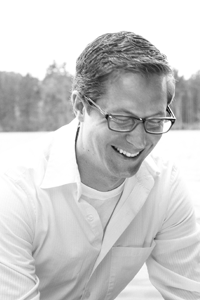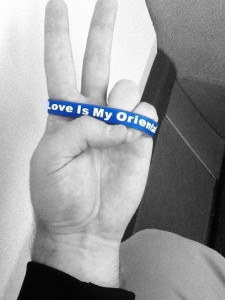This post is written by Michael Kimpan, our Associate Director at The Marin Foundation.
This week the blogosphere was abuzz with all sorts of news in the conversation between the LGBT community and the church.
First, Republican Senator Rob Portman did an about-face on his previous position opposing marriage for same-sex couples as a result of his son coming out to he and his wife.
The Senator admittedly ‘wrestled with how to reconcile [his] Christian faith‘ with his desire for his son to find fulfillment in a healthy relationship, and stated ‘Ultimately, it came down to the Bible’s overarching themes of love and compassion.’
Then at the start of this week, LifeWay Research reported that 64 percent of Americans believe it is inevitable that same-sex marriage will become legal in the US – with 58 percent seeing it as a civil rights issue. The research also showed a declining minority of Americans that see same-sex relationships as sinful – and that those who do are increasingly seen as discriminatory and unfair by culture at large.
Next, Former first lady and Secretary of State Hilary Clinton was featured on HRC’s Americans for Marriage Equality commercial, sparking new rumors about a possible run at the Presidency in 2016.
Then, of course, there was the news of Rob Bell’s statement supporting same sex marriage, about which I contributed an article to our friends at RLC, resulting in their highest website traffic – EVER. And just in case anyone wasn’t sure of his position, he clarified his comments with the good folks at the Odyssey Network yesterday.
Finally, abcNEWS released a poll showing a dramatic rise in support of gay marriage (particularly by young people – 81% of adults under 30) and a steady decline in the number of people who see homosexuality as a choice.
And that was just this week. Next week there are likely to be more.
The ramifications for the conservative evangelical church of the cultural shift which is taking place are staggering. Many fear the loss of relevancy or influence in our culture as all signs point to evangelicals losing their previous place of prominence atop of the cultural hierarchy chain, particularly in a pluralistic, post-modern society.
Having long struggled to stay relevant to young people (six in 10 young people leave the church starting at age 15) and in the wake of the rise of the nones (adults who have no religious affiliation) the temptation for many evangelicals is to decry the ways of the so-called secular world and dig in our heels under the banner of ‘absolute truth‘ declaring all who dare to disagree apostate.
Yet unity does not demand uniformity.
The misnomer that we must agree in order for there to be healthy and sustainable relationship or peaceful and productive dialogue is simply foolish. There will always be different perspectives on homosexuality – in both culture and the church – and to demand a single, uniform voice on a topic as complex as human sexuality seems to me to be as counter-intuitive as it is unrealistic.
Yet I’m convinced this exposed cultural disconnect surrounding homosexuality is merely symptomatic of a broader overarching issue within our communities of faith – Groupishness. The exclusivity of ‘the Other’ has become an identifying factor in many of our churches, in direct opposition to the radical inclusivity of Christ. Drawing lines in the sand on secondary issues has become so crucial to our identity that we’re unfortunately now known more by what we’re against than what we’re for.
The implied demand of this Groupishness is an inherited hostility toward ‘the Other’ – whether that Other is the sexually Other, the politically Other, or even the religiously Other. Our collective response in conversation about homosexuality is merely a symptom of a greater problem. We do the same with people of other faiths – muslims, hindus, atheists and agnostics. We even do it with other ‘brands’ of Christians which think differently regarding baptism, communion or remarriage, or those who get a little too charismatic when their favorite worship song is played.
The issue is…us.
We struggle to put the words and message of Christ into action with anyone who thinks differently than we do – and we therefore surround ourselves with like-minded people, refusing to engage ‘the Other’ in peaceful and productive dialogue until they see things from our point of view.
We demand conformity prior to connection.
Meanwhile , contemporary culture grows increasingly tired of the old paradigm and polarizing rhetoric of us/them || in/out || right/wrong || black/white and the conservative church grows increasingly irrelevant. Could it be that the time of creating churches clubs around issues that fall outside the core tenets of our faith is over? Could the way forward include a commitment to solidarity with the Other and fidelity to the process of reconciliation – regardless of their alignment with politically and culturally divisive issues?
Perhaps the way in which God’s Spirit is moving in the world today has less to do with aligning ourselves to a certain set of beliefs but rather aligning ourselves with a certain set of values? Could it be those values really are as simple as defining Love as our Orientation?
What if God values justice and mercy and compassion more than he values proper doctrine? What if God – as he spoke through the OT prophet Amos – cares more about caring for the poor and the oppressed and the marginalized than he does about subscribing to the ‘right’ beliefs or even belonging to the ‘correct’ church?
I hate, I reject your festivals,
nor do I delight in your solemn assemblies.
Even though you offer
up to me burnt offerings
and your grain offerings,
I will not accept them.I will not even look at
the peace offerings of your failings.Take away from me the noise of your songs;
I will not even listen to the sound of your harps.But let justice roll down like waters
and fair-and-right living like an ever-flowing stream.
When we approach one another as brothers and sisters – image bearers of the God we claim to serve – regardless of what differences we may have (no matter if these differences are revealed in sexuality, politics, religion or otherwise) and celebrate the humanity we have in common, it seems to me we carry divine potential for healing and restoration – for reconciliation.
We have an opportunity and responsibility to allow our words and actions to surge with the power and energy of a life defined by love, rather than our commitment to a specific (whether conservative or progressive) perspective.
By this all will know you are my disciples :: if you have love for one another.
—
Connect with Michael through his thought provoking blog, hit him up on Facebook, or follow him on Twitter.















